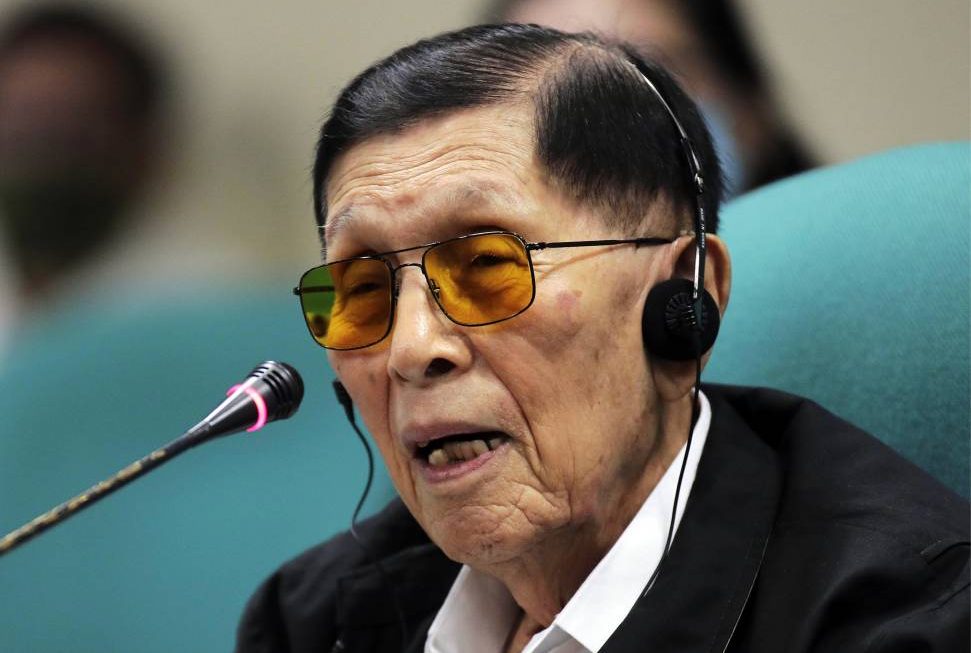Ashes to ashes: The five phases of Juan Ponce Enrile

(Last of three parts)
‘Grand duchy’
But our story takes us back to 2017, when Imee Marcos was still governor of what she breezily calls the “grand duchy” of Ilocos Norte, the Marcos’ home province. She had gotten into hot water with an on-again, off-again rival and ally in provincial politics, Rep. Rodolfo Fariñas, who’d launched a congressional investigation into her spending tobacco excise funds.
He seemed on the verge of pinning her down. In typical take-no-prisoners Ilocos style, he’d placed low-ranking provincial employees in detention to pressure them to testify against the governor. As for Marcos herself, she risked being cited for contempt if she refused to attend congressional hearings meant to produce the evidence to indict her.
What the ex-dictator’s daughter did was this. She showed up at the congressional hearing presided over by Fariñas with her lawyer in tow: Juan Ponce Enrile. Together with Imelda Marcos, the venerable Enrile simply sat beside his client as Fariñas did the political grandstander’s equivalent of averting his eyes.
During the impeachment of Chief Justice Renato Corona back in 2011, Fariñas had practically genuflected each day before Enrile, who’d presided over the trial as Senate President. Now, once again faced with Enrile, Fariñas blinked. As I put it back then: “In the end, without a case, only face-saving rhetoric was left for Fariñas. The main point had been made: Marcoses do not lose. They do not undergo detention. They take on all comers. Their arsenal may be antique, but it works.”
Imee Marcos’ antique arsenal was composed of two ancients, both of them lawyers. One was Estelito Mendoza, who’d been her father’s Solicitor General (or government counsel), and the other was Enrile, who’d been her father’s personal lawyer, secretary (later minister) of defense, and martial law administrator.
Creative approach
What both had in common was a creative approach to the law and legal procedures, which served to astound more conservative (or scrupulous) practitioners. What separated the two was that Mendoza was most effective behind the scenes and operating in the judicial arena. His forays into politics, first as governor of Pampanga and much later as defense counsel for President Joseph Estrada when he was impeached, ended in humiliation and disaster.
On the other hand, Enrile was living proof of the dictum that when the guns speak, the law falls silent. Imee apparently believed a political lynching required the kind of lawyer who made offers that couldn’t be refused.
But it is equally important to consider where Enrile was at the time this primal and primeval exhibition of alpha male behavior took place in Congress. Aside from having served in the Marcos and Aquino Cabinets, he’d been elected four times to the Senate, once to the House, and had been Senate President. But in 2017, he’d been out of office for a year, and out of jail for only two years.
He was, by any normal political reckoning, a figure in the midst of his third, and perhaps terminal, fall from power.
He’d ended up in jail in the first place after being toppled from the Senate presidency because, humiliatingly, he’d been pinned down on corruption allegations that actually prospered and ended up with his arrest, that of his chief of staff, and two other senators besides: one of them the son of former President Estrada, the other, an action star from a show biz dynasty.
Brief stay
For the third time in his political career, Enrile was not only in jail, but this time it wasn’t for political crimes but old-fashioned allegations of pocketing pork barrel funds. The humiliation lay in being laid low by the kind of official mulcting far younger, more obscure, and hungry politicians might do, but which no one of Enrile’s smarts or stature should be caught doing.
But as was the case with his earlier detention on political charges—in 1987, over suspicions he plotted a coup, and in 2001 over egging on a mob to attack the presidential palace—his stay behind bars was brief. Not only was he still somebody; longer incarceration would have provided a highly inconvenient precedent for too many of his peers.
This time, what led to his being released was his great age. (It is noteworthy to bear in mind that cases against Enrile continue to be litigated in court; he is actually out of jail on bail. Then again his client, the president-elect, remains a defendant in multiple cases).
In 2022, much as he ran for office, the professional putschist Gregorio Honasan II dismally failed in a Senate bid. The Marcoses, it seemed, wouldn’t let him grab on to their coattails; neither was the support of outgoing President Rodrigo Duterte, in whose Cabinet he’d served, particularly effective.
But what Ferdinand Marcos Jr. did do was announce that Enrile, in political mothballs and disgraced, would join his Cabinet as chief presidential legal counsel, or the President’s own lawyer—making Enrile, at 98, the oldest Cabinet member in Philippine history.
It wouldn’t be surprising if Enrile was as impervious to irony and as immune to demonstrating a long view of history as the Philippines and its people.
Enrile had very much wanted to be present at the ceremony held on June 30, 2022, when the Marcos Restoration achieved fulfillment with the inaugural of Marcos Jr. The irony was that the ceremony was held on the steps of the very building in which the 1935 Constitution of the Philippines had been drafted, and where the legislature it created had held its sessions, until both were abolished by Ferdinand Marcos in a five-month self-coup in 1972 to 1973.
Where Marcos Jr. took his oath, Enrile had been busy putting the finishing touches on Marcos Senior’s grand plan for an autogolpe.
Enrile V: The Prodigal Minister
What, if anything, was Enrile thinking when he stepped into the presidential study in Malacañan Palace on July 26, 2022, to take his oath of office as chief presidential legal counsel? As he entered that familiar room, did Enrile even think of the many times he’d dreamed of taking possession of the presidency (and that office) and failed in the doing, whether by means of the bullet or the ballot?
Did he reflect, however momentarily, on how he’d first entered that room as a young man eagerly drafted to serve Ferdinand E. Marcos Sr., only to end his political career as a nonagenarian, a useful courtier—but a courtier nonetheless, back where he’d started: this time serving Ferdinand R. Marcos Jr.?
By then he was so old that, in a country where fully 33 percent of the population is below 18, with 60 percent aged 15 to 64 years old and only 4 percent over the age of 65, Enrile become an internet meme, shorthand for being as old as time itself.
By the time he passed away, he had not only outlived his contemporaries, but remained physically and mentally capable of taking advantage of it, to the extent that he repeatedly revised even his own history, and by so doing served as an accomplice to the remarkable process of both erasing and amending the national memory of Filipinos.
In this manner he preserved not only personal power, wealth, and privilege. He also helped restore the Marcoses to the preeminent position from which he’d once been instrumental in ousting them.
Human talisman
Restored to office, he served as a kind of human talisman for the Marcos Jr. A propaganda “coming home” video in which the President, waxing nostalgic for his days as the longest resident princeling in the Palace, played tour guide, came complete with an Enrile cameo: the nonagenarian’s office, it turns out, is in the environs of what was once the late dictator’s sanctum sanctorum—his old private library.
The second Marcos administration marked the fourth political incarnation and third political resurrection of Enrile. He never quite achieved his ambition, and quite often, he destroyed himself. But what made him and kept him relevant was that he was the very model of A Useful Man in politics.
The end, such as it was, began with a vindication indistinguishable from a final humiliation, and finished as an online carnival. From the Sandiganbayan came formal notice that the last obstacle to Enrile ending his life a free man had been eliminated: he was cleared of 15 charges related to the Napoles scam.
But in this, as it turned out, his last appearance, the future was there for all to see, and it spelled out sic transit gloria mundi—thus passes the glory of the world. It was on Zoom, and he was confined to a hospital bed, with a tube up his nose, weak and frail. His appearance was brief and reporters were instructed not to take pictures.
Mere days later, Sen. Jinggoy Estrada informed his colleagues that Enrile was at death’s door, beginning a ghoulish countdown involving a flood of what he’d become to most of the young—a meme.
Few Filipinos can match Enrile’s official résumé over eight administrations: insurance commissioner, commissioner of customs, secretary of finance, twice secretary of justice, thrice secretary of national defense, chief presidential legal counsel, elected senator four times and Senate President twice, member of parliament twice, congressman once.
He died an exceedingly wealthy man, an educated man, and, at 101, he died an old, old man.
2nd most powerful Filipino
He died unencumbered by accountability, particularly for the portion of his life in which he could justifiably claim he was the second-most powerful Filipino in government; the years in which he presided, as a civilian, over the militarization of the country and the subjugation of the nation—and where every crime demanding accountability was foiled by the official narrative of the dictatorship that it was rebels who did all wrong.
He was, ultimately, a destroyer: of constitutions, of reputations, of lives, of the economy, of good governance and civic responsibility. He was no builder and, indeed, so bad at it that even in the instances when he redeemed himself, he set about destroying his reputation all over again.
Still: he died in harness, possessing office, retaining status, imbued with power, endowed with wealth.
But he had failed in the real markers of success for his generation and class: he had a law firm, but it was never the most powerful. He had riches, but never attained the status of a bona-fide mogul. He had position, but had been disgraced in his executive and legislative positions and ultimately denied the presidency. He was a lawmaker with no real legal accomplishment to his name, except getting acquitted. And he didn’t succeed in establishing a political dynasty.

















